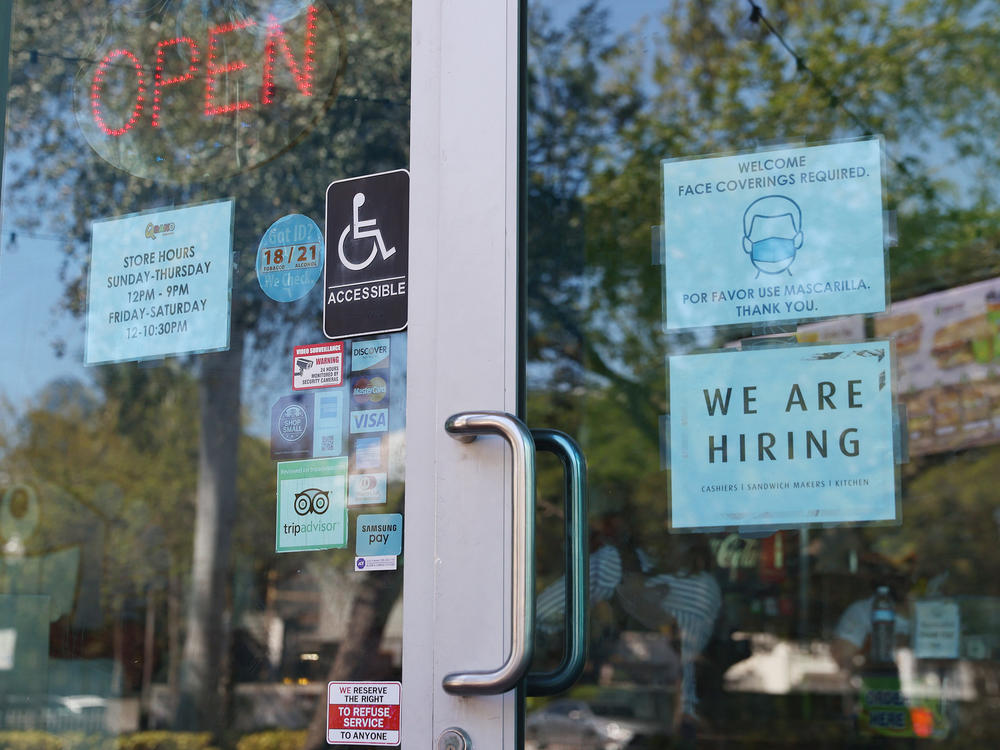Loading...
Section Branding
Header Content
Spring Letdown: Hiring Slows In April, Raising New Challenges For Economy
Primary Content
Updated May 7, 2021 at 1:18 PM ET
Hiring unexpectedly slowed last month as businesses struggled to keep pace with booming demand from newly vaccinated customers.
U.S. employers added just 266,000 jobs in April, according to a monthly snapshot from the Labor Department. It was the weakest month of job growth since January.
"We knew this would not be a 100-day battle," Treasury Secretary Janet Yellen told reporters at the White House. "Today's jobs report underscores the long-haul climb back to recovery."
The unemployment rate rose to 6.1%, from 6% in March, partly because hundreds of thousands of people joined the workforce.
The labor market is still far from fully recovered. Even with last month's gains, there are still 8.2 million fewer workers on payrolls than there were before the pandemic. Job gains for March were also revised down, from 916,000 to 770,000.
Some employers say they're having difficulty filling jobs, even though millions of people are still out of work.
"A fast-food restaurant in town here has a sign looking for people to staff the drive-thru and they're offering a $500 signing bonus," said Wells Fargo economist Tim Quinlan.
Nearly a third of the U.S. population is now fully vaccinated. But many people are still vulnerable to COVID-19, and some are wary of returning to work, especially in settings where they could be exposed to the virus. Others are busy caring for sick relatives or looking after children whose schools have not yet reopened.
Yellen noted that of the 4.2 million women who left the workforce during the pandemic, 2 million have yet to return. She argued the U.S. needs to do more to help people balance work and family life.
"Our policy-making has not accounted for the fact that people's work lives and their personal lives are inextricably linked, and if one suffers, so does the other," Yellen said.
Details in the jobs report point to a shift in consumer behavior as Americans gradually emerge from their pandemic cocoons. They're eating out more and cooking at home less.
Bars and restaurants added 187,000 jobs in April, while grocery stores and delivery services — which thrived during lockdown — cut staff.
"As the public health situation improves, those industries that have been hardest hit by the pandemic are the ones that are going to see a large rebound," said Daniel Zhao, senior economist for the job search website Glassdoor.
Supply chain disruptions also weighed on job growth in April. Automakers, which have struggled with a shortage of computer chips, also idled workers, and manufacturing employment declined by 18,000.
While some employers are offering bonuses and other one-time rewards for new workers, there's limited evidence of the kind of permanent pay increases that would typically signal a genuine shortage.
Average hourly wages rose by 20 cents in April. "The data for April suggest that the rising demand for labor associated with the recovery from the pandemic may have put upward pressure on wages," the Labor Department said Friday. But analysts cautioned that a wide variation in wages across industries makes it hard to draw firm conclusions.
"We are certainly not seeing rapid wage growth that would really be the red flag of 'Wow, things are tight. Employers truly on a really widespread basis can't find the workers that they need,' " Heidi Shierholz, of the Economic Policy Institute, said.
Some employers argue that supplemental unemployment benefits and other relief programs are discouraging people from returning to work, although academic researchers have found otherwise.
Montana and South Carolina announced this week that they will suspend federal unemployment benefits in late June, two months before the programs are set to expire nationwide. Instead of the federal benefits — which include an extra $300 per week — Montana will offer a one-time, $1,200 bonus to people who return to work.
"I hear from too many employers throughout our state who can't find workers," Gov. Greg Gianforte said in a statement announcing the change. "Nearly every sector in our economy faces a labor shortage."
Copyright 2021 NPR. To see more, visit https://www.npr.org.

